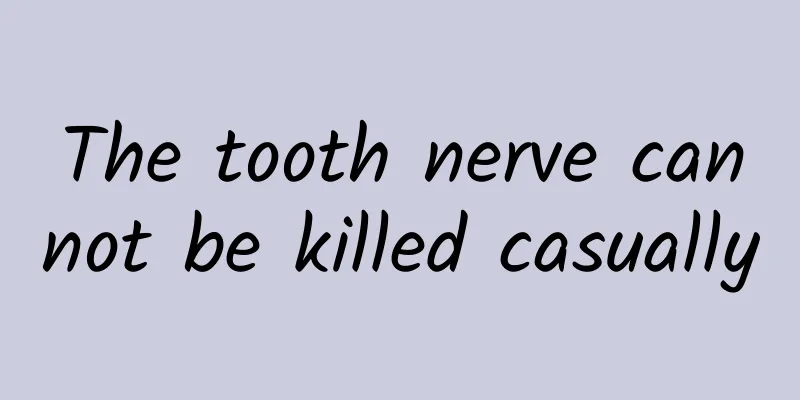The tooth nerve cannot be killed casually

|
For people with caries or micro-cracks in teeth, toothache is very likely to occur. Toothache is actually tooth nerve pain. Sometimes the pain is very painful for the patient. Patients with toothache sometimes choose to kill the nerve, which can solve the problem once and for all and prevent similar pain in the future. However, killing the tooth nerve must be done with caution as it has a great impact on health. Symptoms of stimulation being sensed by the "tooth nerve" A healthy dental pulp plays an important role in the strength of teeth. When the destruction of the tooth's hard tissue reaches the second layer or below, the physical and chemical stimulation in the mouth is sensed by the "dental nerves", and the patient's symptoms at this time may be: 1. The affected teeth are sensitive and uncomfortable to cold and hot water, sour and sweet foods; 2. Lightning pain or severe pain; 3. Severe pain when food is stuck in the tooth cavity; 4. Not drinking water or eating, that is, severe pain occurs without obvious inducement; 5. The occasional dull pain that doesn’t leave a deep impression. Don't kill the tooth nerve casually Because discomfort and pain are the main reasons why patients seek medical treatment, at this time, the first thing they think of is to kill the "dental nerve" to "put an end to it all." Some patients even demand that the "dental nerve" must be killed. In fact, after taking some auxiliary examinations and removing the decayed parts of the hard tissue of the teeth, we confirmed that it is only necessary to "kill the dental nerve" when the tooth disease has affected the pulp. Otherwise, practical measures should be taken to protect the pulp. Teeth with dead "dental nerves" are more brittle and more easily broken than teeth with living "dental nerves". The purpose and function of "killing the tooth nerve" is to temporarily relieve the pain caused by the lesions reaching the dental pulp and to prepare for the next step of treatment. When the lesions have not involved the dental pulp, you must not "kill the tooth nerve". At this time, taking other measures can also relieve discomfort and pain. Dental nerves cannot be killed casually. Only when tooth decay causes the dental nerve to corrode and necrotize, should we consider whether to remove the dental nerve. There is bone under the pulp. After the pulp is extracted and the pulp cavity is empty, bacteria and pathogens can easily infect downwards. Even if it is absolutely necessary to kill the dental nerve, the pulp cavity must be thoroughly cleaned and disinfected, and then filled and sealed with special substances to block bacteria and pathogens from infecting it. |
<<: How to do wire teeth correction
>>: Why are there so many melanin on children's teeth?
Recommend
Complications after hemodialysis
When a person suffers from severe renal failure, ...
What to do if you lose weight
In life, some people excessively pursue thinness ...
Low number of intermediate cells
In daily life, it is difficult for people to avoi...
Why is the outside of my nose itchy?
If the outside of your nose is always itchy, you ...
What causes sciatica pain in the buttocks?
If we encounter symptoms such as sciatica in the ...
How to do anoscopy? Just three simple steps
The patient will feel some discomfort during anos...
What are the symptoms of anterior fibular ligament rupture?
When the anterior talofibular ligament is rupture...
Is the pain on both sides of the lower abdomen a sign of pregnancy?
When a woman just becomes pregnant, many changes ...
How to cure tinea corporis to eradicate it, and the prognosis of treatment should be good
The treatment of tinea corporis is still mainly b...
What medicine to take for bronchial asthma
Bronchial asthma is a relatively common disease n...
What are the dangers of hyaluronic acid filling in the chin?
The normal chin length is two-thirds of the dista...
Guizhi Fuling Concentrated Pills
There are many gynecological medicines on the mar...
Why is rabies afraid of water?
Rabies, also known as hydrophobia, is a symptom t...
Why is my head feeling heavy?
Why does my head feel heavy? Many people often fe...
What should I do if my herpes simplex virus antibody is positive?
Under the slogan of eugenics, many friends will m...









